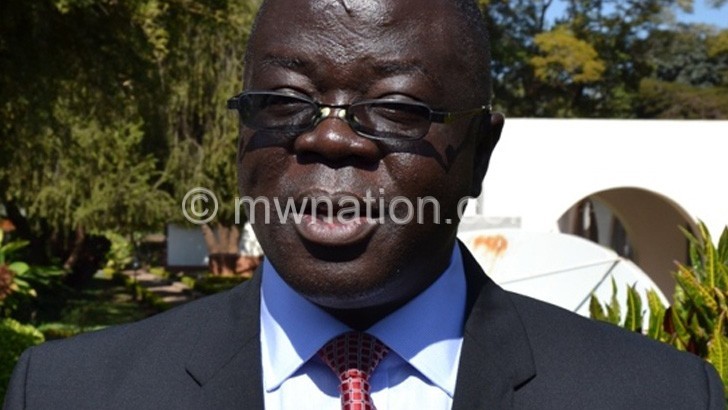‘Corruption does exist in the Judiciary’
Two weeks ago, Commonwealth member States unanimously elected Lilongwe-based High Court Judge Charles Mkandawire as president of the Commonwealth Magistrates’ and Judges’ Association (CMJA) during its annual general assembly held in Australia. The Judge will lead a council of 30 members drawn from the association’s six regions for the next three years. In this interview, our News Analyst LUCKY MKANDAWIRE talks to him about his election and other issues.

Could you briefly explain about Commonwealth Magistrates and Judges Association and its functions?
The Commonwealth Magistrates’ and Judges’ Association [CMJA] was formed in 1970 through the initiative of a man known as Sir Thomas Skymme a British citizen. At first, it was known as the Commonwealth Magistrates’ Association [CMA]. In the mid 1980s Judges had also expressed interest to join the association and it became to be known as Commonwealth Magistrates’ and Judges’ Association [CMJA]. Its patron is Queen Elizabeth II of the United Kingdom and the Secretariat of CMJA is based in London. The aims and objectives of the association are:
- Advance the administration of the law by promoting the independence of the Judiciary.
- Advance education in the law, the administration of justice, the treatment of offenders and the prevention of crime within the Commonwealth.
- Disseminate information and literature on all matters of interest concerning the legal processes within the various countries comprising the Commonwealth.
How did you feel to be unanimously elected as president of the association?
My election to this great office of president of CMJA came to me as confirmation that each one of us has a destiny. I felt very humbled. There are about 54 member States comprising the Commonwealth. These countries are giants in their own right. It was amazing to see that when my name was put forward as a candidate for the office of president having been nominated by the Magistrates’ and Judges’ Association of Malawi [Majam], the entire Brisbane Convention and Exhibition Centre with about 500 delegates exploded in applause. There was no country or member association which wanted to put forward their candidate to compete with me. I was, therefore, elected through what we call an acclamation.
What do you desire to achieve?
I would like to ensure that there is a clear understanding of the doctrine of separation of powers among the three branches of government. The other issue relates to appointments of judicial officers. It is my desire that by the time I leave office in 2021, Commonwealth Judiciaries should have adopted modern and transparent systems of appointments of judicial officers.
The other area that needs a lot of attention is the status of magistrates in most commonwealth judiciaries. It would appear that most attention is focused on Judges of Superior courts yet the majority of our cases are handled by magistrates. This class of judicial officers deserves our attention and I have a passion for improving the status of magistrates in the entire commonwealth village.
How will Malawi benefit from your association?
The Malawi Judiciary stands to benefit a lot from the membership of CMJA. The CMJA runs training programmes for magistrates, judges and administration staff. The CMJA through its network facilitates identification of resource persons in training programmes. The CMJA conducts study tours to comparative jurisdictions. Through these programmes, we stand to benefit.
QThe integrity of the Malawi Judiciary has recently been tarnished with allegations corruption. How do you intend to ensure that dignity is restored?
AJudicial corruption has been a very relevant topic for discussion in most CMJA conferences. For your information, one of the topics for discussion during the just ended conference and general assembly in Australia was “A privilege to serve the nation – Fighting corruption and maladministration”.
We in the Malawi Judiciary have accepted that corruption does exist in the Judiciary. We do not want to leave in a fools’ paradise where we become so defensive about judicial corruption. It is because of this realisation that the The Chief Justice had decided to establish the Judicial Integrity Committee chaired by a High Court judge. This committee does sensitise judicial officers and staff on the evils of corruption in the judiciary. It investigates complaints of corruption in the judiciary and makes recommendations to the Judicial Service Commission which may even lead to prosecution.
One great concern from the public relates to delays in the country’s courts to issue judgments. As CMJA president how do you intend to help resolve the issue?
It’s true that there has been an outcry on delayed judgments. This problem is common in most commonwealth countries and it is largely due to understaffing of judges as well as lack of human capital such as legal researchers for the judicial officers especially the judges. As CMJA President, I have to navigate carefully on some of these issues. Firstly, after understanding the constraints of our Judiciary, we have to take stock of these delayed judgments through the office of the Judges-In-charge and the Office of the Chief Justice. I am glad to inform you that through the Office of the Chief Justice, delayed judgments has already been identified as a problem in our Judiciary and strategies have been put in place on how to mitigate this issue.
What is your final comment as the newly elected CMJA president?
First, I would like to thank God for this wonderful gift. Second, I would like to thank the Magistrates’ and Judges’ Association of Malawi for having nominated me to stand and compete for the election to the office of the president of CMJA. n





